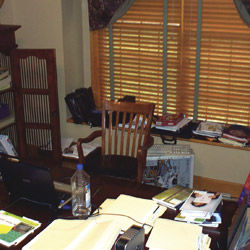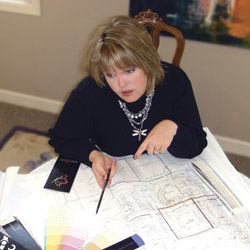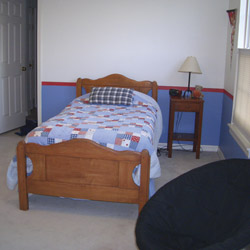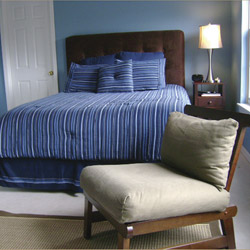Feng shui is a 3,500-year-old holistic art and science designed to support your dreams by creating space in your home, office, or yard that makes you feel good. It’s the art of living in balance and harmony with your environment.
The History of Feng Shui
While feng shui was originally used to choose favorable places in which to live or be buried after death, today, it is almost exclusively used for interior design and the organization of homes and offices.
Literally translated, “feng shui” means “wind and water.” According to a home décor article by Lowe’s Home Improvement, feng shui is a philosophy, a science and an art, the effects of which “are felt in the mind, body and spirit in ways that enhance or diminish one’s personal chi.” Chi, a word used to describe life force or energy, is the driving force behind feng shui and is said to have a considerable impact on one’s success, health, temperament, relationships and career. When in balance, the five elements of feng shui—wood, earth, metal, fire and water—aid the flow of chi.
One tool used by feng shui consultants is a map that can be applied to every space, called a bagua. Generally displayed in an octagonal shape, the sides and center of the map each represent one of nine major areas of life: health; fame and reputation; relationships and love; creativity and children; helpful people and travel; career and life path; skills, knowledge and wisdom; family and foundation; and prosperity and abundance. Each part of the bagua has a corresponding color which is helpful in decorating a home or office. For example, if one wanted to concentrate on strengthening his or her family, green would be the color of choice. If searching for love or trying to create a new relationship, shade s of pink would be appropriate.
s of pink would be appropriate.
It Just Feels Good
If you’ve ever walked into a home or office “that just feels wonderful and makes you want to stay there, that’s good feng shui,” according to Victoria Michaels, life coach, feng shui consultant and president of Savvy Solutions. “If you walk in and it just feels uncomfortable and you can’t even explain why…you just don’t know, it just doesn’t feel right, that’s bad feng shui.” Experts strive to make changes to spaces which allow chi energy to flow freely throughout homes and offices. By concentrating on what a client wants to improve in his or her life, consultants like Michaels and Becky Cobb of Wellness By Becky know where to begin and what changes need to be made.
Michaels began her business as a wardrobe consultant in 1989, and later “came out of the closet,” she said, “and started organizing other aspects of the home.” Experience has taught Michaels that when people have clutter in their homes, she can walk through correlating the clutter with a bagua and understand what’s going on emotionally with the homeowners. It’s after applying the principles of feng shui that people’s lives change. “I’ve seen it time and time and time again,” Michaels said. “I’m in awe of the process, really. It amazes me.”
The experts we spoke with reported that most of their clients are looking to implem ent changes that would help them make more money, create new or improve existing relationships, or are concerned about their health. Michaels has had several clients who came to her looking for ways to help create new relationships after divorces. While they say they’re looking to find new relationships, oftentimes their wedding dresses from previous walks down the aisle are hanging in their closets. Michaels said she’s gotten a variety of reasons for holding onto the dresses, but believes “you can’t move on to the future if you’re still holding onto the past.” This is where life coaching comes into helping her feng shui clients.
ent changes that would help them make more money, create new or improve existing relationships, or are concerned about their health. Michaels has had several clients who came to her looking for ways to help create new relationships after divorces. While they say they’re looking to find new relationships, oftentimes their wedding dresses from previous walks down the aisle are hanging in their closets. Michaels said she’s gotten a variety of reasons for holding onto the dresses, but believes “you can’t move on to the future if you’re still holding onto the past.” This is where life coaching comes into helping her feng shui clients.
Most of Michaels’ clients come to her by referrals from others whose lives have dramatically changed after working with her. “Their lives change and they get excited and tell their friends.”
Cobb understands that a good portion of her clients are merely curious about feng shui and aren’t willing to make major modifications to their homes. “I try to be realistic about what a person can afford to change in his or her home and what they will do to follow through on the suggestions,” she said. “I try to work with them on what they are willing to do and how to make the best of the situation.”
In-Home Assessments
Both Michaels and Cobb said the first thing they do when called to a client’s home or office is sit down and have a conversation about what he or she would like to change—what his or her goals are. Cobb said she gives mini-lessons on feng shui when necessary so her clients understand what it is she’s going to do in their spaces. Michaels has a questionnaire that helps clients assess exactly what it is they’re looking for. (Sometimes we don’t even know what we really want!)
“So many times in life, we say, ‘I want to be happy.’ Well, what does that mean,” Michaels inquires. “What is happy for you? Happy for me and happy for you are going to be two different things, so really, identifying what it is you want to create in your life—what you are dissatisfied with—is important.”
Both consultants then do walkthroughs of the space with clients and begin dialogues about what is going on in their lives at the time, getting more specifics about what they hope to gain from bringing in a feng shui consultant. “I walk through the house looking for poison arrows, areas with blocked or stagnant chi, and the use of the five elements,” Cobb explained. “That might include how furniture is arranged, the use of colors, artwork or decorations, etc.” Cobb discusses ways in which chi can better flow through the space, and how helpful enhancing the correct element in each part of the house can create major change in clients’ lives. “If the owner is interested in health, wealth, career change, relationships, etc., I put a special focus on those parts of the house,” she said.
Michaels said her clients are often amazed at how much she knows about their personal lives based solely on reading the baguas of their space. “If this is the prosperity corner and you’re stacked to the brim with newspapers or magazines…and you tell me your money’s not moving, well, it’s stuck; it’s stagnant. It can’t move because there’s no movement in this room or space.”
Michaels said she not only assesses the space for correlation with the principles and philosophies of feng shui, but she gets in there and moves furniture if that’s what her clients need, or helps them organize a room or closet when necessary. This is another time when her experience as a professional organizer and life coach come into play.
Getting Into It
One of the most frequent circumstances Michaels finds herself in is helping clients clean closets or houses after losing parents. Because she has lost both of her parents, Michaels understands the emotion involved in keeping a hideous vase, for example. “You can’t explain why you want to hold on to [it], but when you think about getting rid of it, you just lose it.” In her opinion, there’s a process involved in letting emotional things go, deeming the “if you haven’t used it in a year get rid of it” philosophy too painful. “If you don’t go through the process of letting it go, you may never understand what it is you were holding on to,” she said.
In these instances, her strengths as a life coach and professional organizer are very helpful in applying feng shui to spaces. Sorting closet clutter in the pursuit of feng shui-ing a room or home is just one of the ways in which Michaels stands out. By asking clients to put items in four piles—absolutely keep, give away to charity, throw away and “I don’t know yet”—she helps clients through one of the most important tasks/aspects of feng shui—clear the clutter. “It’s really low-pressure, but I am a life coach, so I’m going to be there saying ‘Is this really serving you? Is this taking up space without paying rent?’”
The implementation of the suggestions Michaels gives clients after her walkthrough takes different amounts of time for each unique situation. Some of her clients are ready to take her suggestions and run with them while others need several more visits to complete the transformation of their space. “If you’ve had clutter around you for so long, all you do is just feel bad about it. You don’t necessarily see it anymore…So, when you get a shelf cleaned off, or a drawer cleaned out, you get inspired and you feel better, and that alone can get people” to apply the transformation to their entire home or office themselves.
Michaels pointed out that conscious organizing is important in feng shui. To explain this concept, she gave a very interesting example: “Most of us women will put our kitchens together based on how our moms did it. That may not work. Your mom may be shorter or taller than you or have different needs than you, might not be you.” By asking questions like “Do you prefer reaching up or down? And “Would you rather move to the right or to the left?” Michaels is able to help people see that they really do have a preference and can intuitively organize their spaces based on their own needs.


Transform Your Space
While the only clue that a home or office has been transformed
according to the philosophies of feng shui other than the lack of
clutter, feng shui will have an enormous effect on those who live or
work in the space day after day. With the use of colors and the five
key elements, spaces can promote the flow of chi and allow dwellers to
focus on their current life goals in ways they might not have
previously understood. If your space needs a bit of help, or you’re not
sure how to transform your home or office, you might want to give Cobb
or Michaels a call. Surely they will be able to help you transform you
space and, in turn, begin transforming your life. a&s


